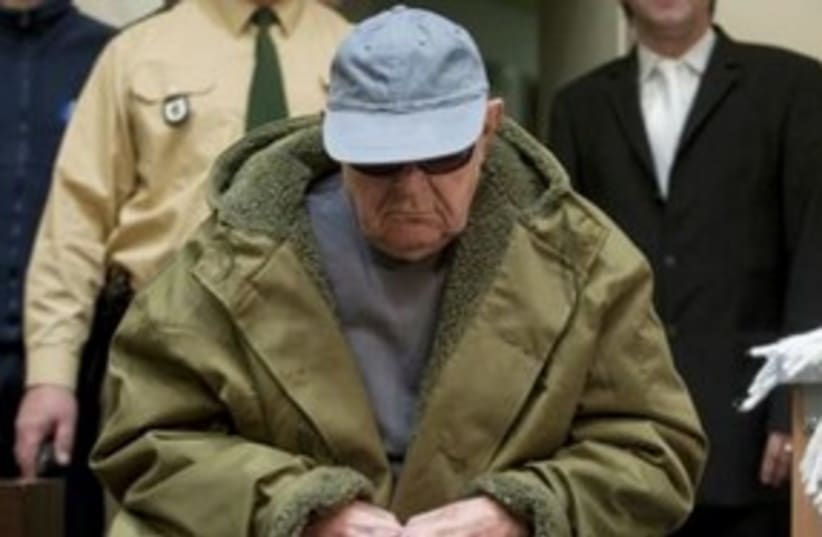RELATED:Holocaust justice: The final chapter'Soviet Union likely forged evidence in Demjanjuk trial'The Munich court found the 91-year-old guilty of being an accessory to mass murder as a guard at Sobibor camp in Poland during World War Two."Humanity owed this to the memory of the tortured and the dead," Elan Steinberg of the American Gathering of Holocaust Survivors and their Descendants said, adding his "cynical manipulation of the legal system has at last been ended."Demjanjuk had been exonerated in a separate Holocaust trial two decades ago in Israel, where he was initially sentenced to death for being the notorious "Ivan the Terrible" camp guard at Treblinka in Poland. The ruling was overturned by Israel's supreme court after new evidence exonerated him.Ukraine-born Demjanjuk, who was once top of the Simon Wiesenthal Center's list of most wanted Nazi war criminals, said he was drafted into the Soviet army in 1941 then taken prisoner of war by the Germans.Demjanjuk attended the 18-month court proceedings in Munich - birthplace of Adolf Hitler's Nazi movement - in a wheelchair and sometimes lying down, with his family trying to argue that he was too frail to stand trial.His son, John Demjanjuk Jr., said in an e-mail ahead of the verdict that his father was a victim of the Nazis and of post-war Germany."While those who refuse to accept that reality may take satisfaction from this event, nothing the Munich court can do will atone for the suffering Germany has perpetrated upon him to this day," he said.Prosecutors had faced several hurdles in proving Demjanjuk's guilt, with no surviving witnesses to his crimes and heavy reliance on wartime documents, namely a Nazi ID card that defence attorneys said was a fake made by the Soviets.Guards at Nazi death camps like Sobibor were essential to the mass killing of Jews because extermination was the focus of such camps, prosecutors said. Some 250,000 Jews were killed at Sobibor, according to the Wiesenthal Center.Defence attorney Ulrich Busch told the Munich court on Wednesday that even if Demjanjuk did become a prison guard, he did so only because as a prisoner of war he would have either been shot by the Nazis or died of starvation.Demjanjuk emigrated to the United States in the early 1950s and became a naturalized citizen in 1958, working as an engine mechanic in Ohio.
Munich: Demjanjuk found guilty of helping kill 27,900 Jews
"Humanity owed this to the memory of the tortured and the dead," survivors group says following verdict on Sobibor guard; Demjanjuk sentenced to five years in prison.

RELATED:Holocaust justice: The final chapter'Soviet Union likely forged evidence in Demjanjuk trial'The Munich court found the 91-year-old guilty of being an accessory to mass murder as a guard at Sobibor camp in Poland during World War Two."Humanity owed this to the memory of the tortured and the dead," Elan Steinberg of the American Gathering of Holocaust Survivors and their Descendants said, adding his "cynical manipulation of the legal system has at last been ended."Demjanjuk had been exonerated in a separate Holocaust trial two decades ago in Israel, where he was initially sentenced to death for being the notorious "Ivan the Terrible" camp guard at Treblinka in Poland. The ruling was overturned by Israel's supreme court after new evidence exonerated him.Ukraine-born Demjanjuk, who was once top of the Simon Wiesenthal Center's list of most wanted Nazi war criminals, said he was drafted into the Soviet army in 1941 then taken prisoner of war by the Germans.Demjanjuk attended the 18-month court proceedings in Munich - birthplace of Adolf Hitler's Nazi movement - in a wheelchair and sometimes lying down, with his family trying to argue that he was too frail to stand trial.His son, John Demjanjuk Jr., said in an e-mail ahead of the verdict that his father was a victim of the Nazis and of post-war Germany."While those who refuse to accept that reality may take satisfaction from this event, nothing the Munich court can do will atone for the suffering Germany has perpetrated upon him to this day," he said.Prosecutors had faced several hurdles in proving Demjanjuk's guilt, with no surviving witnesses to his crimes and heavy reliance on wartime documents, namely a Nazi ID card that defence attorneys said was a fake made by the Soviets.Guards at Nazi death camps like Sobibor were essential to the mass killing of Jews because extermination was the focus of such camps, prosecutors said. Some 250,000 Jews were killed at Sobibor, according to the Wiesenthal Center.Defence attorney Ulrich Busch told the Munich court on Wednesday that even if Demjanjuk did become a prison guard, he did so only because as a prisoner of war he would have either been shot by the Nazis or died of starvation.Demjanjuk emigrated to the United States in the early 1950s and became a naturalized citizen in 1958, working as an engine mechanic in Ohio.